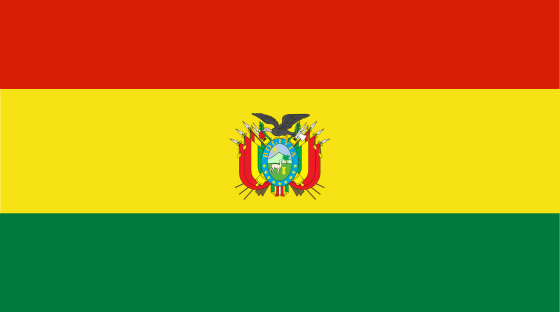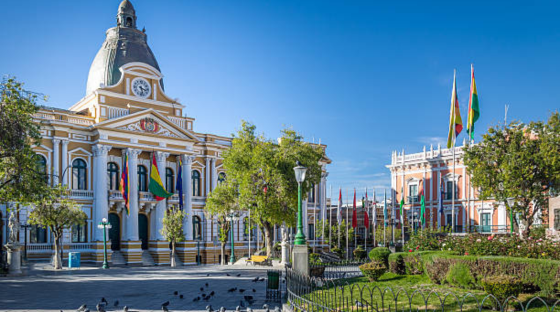Bolivia
Explore how Bolivia is investing heavily in technology and education, fostering a digital transformation for its future.

Overview
While investors have long been attracted by the natural resources in Bolivia, the country has undergone a digital transformation in recent years. Investment in the technology and education sector by the government is focusing on tech manufacturing, telecommunications, fintech, and financial services, with initiatives such as low-interest loans to support SMEs and startups. However, Bolivia has one of the highest degrees of income inequality in the world and faces challenges from a talent drain to Argentina and Chile in search of more work opportunities and higher wages.
Known as the “Heart of South America”, landlocked Bolivia is geologically rich, with mines producing tin, silver, lithium, and copper. A third of the country lies within the Andean mountain range, once part of the great Incan Empire before colonization by Spain, which built much of its empire on extracted Bolivian silver. The world's largest salt flat, Salar de Uyuni, is a popular international tourist attraction in the southwest, becoming so reflective during the rainy season that US astronaut Neil Armstrong could see it from space.
The Accelerance Global Network is the most curated list of high-quality global teams ever assembled.
600
Developers
Total number of developers in our certified partner network by country
2
Certified Partners
Total number of certified partners in our global network by country.
12hrs
Time Travel (From NY)
Average flight time from NY to the major cities in the country.
122
Partner Innovation capability
The score reflects investment in STEM progrms and IT funding by country.
91
Partner Skill Level
Level of workforce skills and quality of education, including factors such as digital literacy, interpersonal skills, etc.
105
Partner Global Competitiveness
National productivity based on 12 core pillars, including government policy, infrastructure, economic stability, etc.
Medium
Software Outsourcing Readiness
Overall rating, based on the maturity of the tech sector, socio-political conditions, and on-the-ground research by Accelerance.
.png?width=600&height=375&name=Untitled%20design%20(1).png)
Talent Pool & Education
Government initiatives and private institutions encouraging STEM education across Bolivia are fueling the development of the tech ecosystem and nurturing a generation of young entrepreneurs. The number of IT professionals is increasing in tandem, with the majority working in software engineering, information systems, and web development.
According to the Electronic Government and ICT Agency’s Digitizing Bolivia program, the country has more than 200 companies that specialize in software development, collectively earning around $30 million annually. The agency has been developing free robotics courses for girls throughout the country to narrow the gender gap in technology and encourage greater female participation.
Private institutions such as Bolivia Tech Hub and Hub Santa Cruz are also improving access to education and business opportunities in science and technology. These institutions host both incubators and accelerators for entrepreneurs, as well as providing spaces for young people to develop their skills and learn industry trends.
The largest city and commercial center, Santa Cruz, is home to more than 20 universities, both private and public, as well as numerous tech companies, ranging from startups to established operations. The Silicon Valley-based Founder Institute operates a pre-seed accelerator program in Santa Cruz, providing mentorship and funding to help formalize the country’s entrepreneurial scene, running almost 1000 free startup events each year.
Language
Spanish is the official language, but the prevalence and proficiency of English has shown strong growth over the past few years. While not widely spoken at the local level, officials and businesspeople in commercial centers often have English skills and there are minimal communication barriers with Bolivian professionals.

Economic Outlook
Bolivia’s full integration into the Southern Common Market (Mercosur) and better government-private sector engagement are significant developments. Previously an associate member, Bolivia's full membership has been eight years in the making and is expected to boost regional integration as well as establish new markets for Brazilian companies, given its vast reserves of natural gas, lithium, and other strategic minerals. Bolivia is home to the world's largest lithium reserves, which remain underexplored and untapped, offering huge potential value for both the country’s economy and the global green transition.
However, Bolivia lacks economic diversification, making the country's economic growth largely supported by natural gas exports, which have experienced a sizable downturn and led to worsening government debt. Foreign reserves have deteriorated to dangerously low levels, threatening the boliviano's peg to the US dollar and raising risks of a currency or balance-of-payments crisis. Political instability is also expected to cause continued economic disruption following protests in early 2024 that resulted in road blockades at important choke points.
Growth is expected to decline gradually to about 1.5% by 2025 as El Niño weather oscillation will be compounded by declining public spending, including on public investments – the result of limited access to external financing and falling international reserves. High public debt and low buffers increasingly expose the country to lower commodity prices, tighter global financial conditions, lower gas production, and natural disasters, such as a stronger El Niño than expected.
Political Conditions
The ruling left-wing Movimiento al Socialismo (MAS), Bolivia's largest party, has effectively split between supporters of President Luis Arce and party leader Evo Morales. In December 2023, the Constitutional Court disqualified Morales from running for a fourth term as president in 2025. The ruling was followed by protests supporting Morales, and ongoing social unrest raises the risk of disruptions to business operations. Political commentators believe Morales will choose an ally to represent him and challenge Arce, the party’s likely candidate.
MAS has been the dominant force in Bolivian politics for almost two decades, so the feud has significant implications in both the short and long term for the basic functioning of the government and the upcoming election. No group from the MAS factions or the centrist and right-wing opposition has enough votes in either the upper or lower house of Congress to pass legislation.
The country’s lingering political instability results from the 2019 presidential election, in which Morales ran for a third consecutive term, in violation of the constitution and in defiance of a referendum result. He won the election, but allegations of fraud (later contested) sparked massive opposition protests and his resignation into exile. Both the interim government, led by the opposition, and Arce’s subsequent MAS government have weaponized the courts, targeting each other with what many observers consider to be politically motivated judicial proceedings.
Learn more about our customer stories.
Looking for a customer story in a specific technology or industry? Discover compelling customer narratives within a specific technology or industry that resonate with your unique software development needs.

%20(1).png?width=300&name=WEBSITE%20Stop%20Chasing%20Low%20Hourly%20Rates%20Unlock%20the%20True%20Value%20of%20Offshore%20Development%20(450%20x%20253%20px)%20(1).png)




